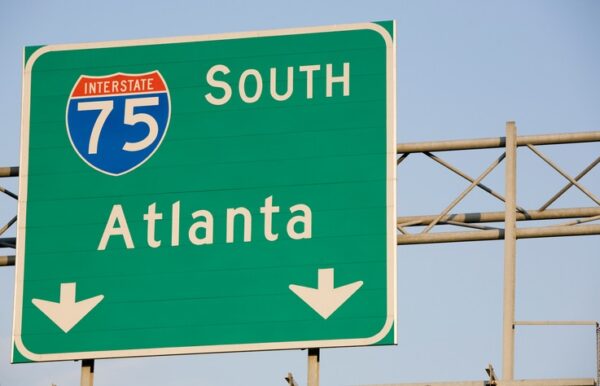
Georgia’s highway congestion problem is so severe that in 2017, transportation analytics’ company INRIX ranked Atlanta as the fourth most bottlenecked urban area in the country.
Drivers from Atlanta spent an average of 70 hours sitting in traffic during peak hours in 2017. To put it in financial terms, the hours spent in traffic cost each driver an average of $2,212 annually; the overall cost to the metro area equaling a shocking $7.1 billion in one year!
Can eliminating big trucks from the most congested parts of the highway help relieve some of Atlanta’s traffic problem?
Georgia Plans for a Truck-Only Highway
Georgia Department of Transportation (GDOT) has come up with what it believes could be a solution to the problem—building a new truck-only highway corridor along I-75.
The proposed new lanes will be built along a stretch of the highway between Mcdonough and Macon—one of the nation’s biggest trucking routes – by providing an alternate route for trucks.
- Statistical data shows the chances of fatalities increase dramatically when large trucks are involved in accidents.
- Many believe that the highway expansion will improve safety by separating dangerously oversized 40-ton trucks from other cars.
However, others question if this proposed solution will improve congestion for the investment.
Highway Project Expected to Cost $1.8 Billion
Not everyone is convinced that the highway additions will solve the problem, or even help at all. The project is estimated to cost $1.8 billion—an amount taxpayers aren’t willing to take lightly.
Every year, Consumer Advocacy Group U.S. PIRG (Public Interest Research Group) releases a report that highlights the country’s most wasteful projects that they call “Highway Boondoggles.” The group included Georgia’s proposed truck lane corridor on I-75 in Highway Boondoggles 3’s 2017 list of shame and has called the plan a blunder.
Concerns regarding Georgia’s Highway plan include:
- Insufficient evidence that the project will improve highway congestion: When new highways are built, commuters flock to the new roads while businesses set up shop nearby for easy highway access. Because of this, highway expansion can ultimately end in even more congestion.
- Past Failed Attempts in Texas: New highway expansion projects have failed in the past. Katy Freeway in Houston, Texas is infamous for traffic jams. A $2.8 billion highway widening project increased the freeway to 26 lanes to attempt to fix the congestion problem. However, the problem only got worse. Morning commutes actually increased by 30 percent while afternoon commutes took over 50 percent longer. Building new routes do not guarantee the problem will be resolved.
- Alternative transit solutions have been ignored: In a 2016 state audit, GDOT was criticized for not attempting alternative transportation options before beginning highway expansion. Instead of widening roads, there are other options to reduce congestion. Officials may have overlooked other effective ways to eliminate traffic such as better public transit, walking and biking options.
New Highway Plans Praised by Government Officials
Supporters are looking to the future when it comes to the highway expansion project. Estimates project that the number of hours vehicles spend in traffic would drop by 40% after the implementation of the new highway structure, according to a study commissioned by GDOT.
Some in favor of the expansion plan argue that the recent surge in the development of autonomous trucks could change the way our highways function and that it is very possible that local Georgians may see the I-75 eventually turn into a self-driving trucking corridor. In fact, Embark’s self-driving truck just successfully completed a coast-to-coast test, meaning the evolution of trucks may be closer than once thought.
Although the I-75 highway project has raised concern among drivers and Advocacy groups, government officials are enthused about its prospects.
GDOT Spokesman Scott Higley defended the decision to pursue the project: “Expanding the corridor to remove heavy commercial vehicles from general purpose lanes will decrease direct contact and congestion between passenger vehicles and trucks, providing safer and more efficient travel for both.”
Whether you’re a supporter of the new highway expansion project or against the idea, only time will tell if Georgia has made the right decision to help eliminate congestion.
